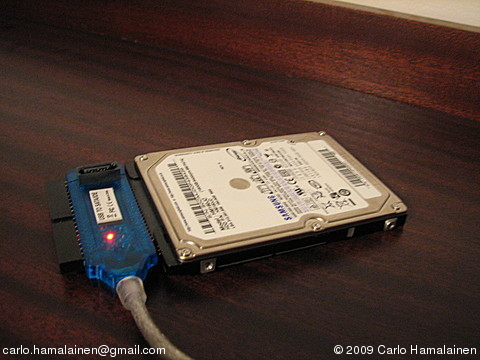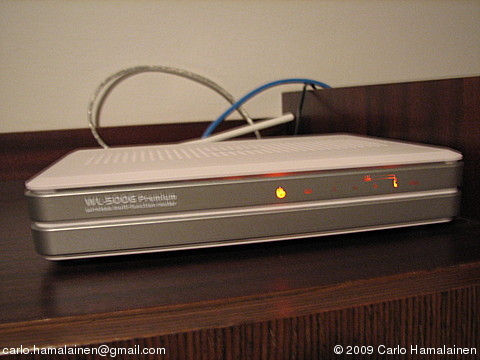Update (2009-04-23): after a reboot my WL-500gP no longer booted Debian. Nothing appeared in the logs, so it really had me stumped. I ended up installing DD-WRT and all is well.
Here are my notes for installing Debian on an Asus WL-500gP (Premium v1). I basically followed this guide. I’m using the WL-500gP as a PC, not a router, so I have no information here about how to configure the VLAN stuff using robocfg.
Flash the kernel image
Install tftp on your PC, download the kernel openwrt-brcm47xx-2.6-jffs2-128k.trx and Debian image debian-mipsel-2007-Apr-17.tar.bz2 from here.
Set your PC to static IP 192.168.1.3 with gateway 192.168.1.1
Turn off the router. Hold down the “restore” button on the back, and turn on the power. Hold the button until the power LED on the front of the router flashes slowly.
The router is now in diag mode. Upload the image:
$ tftp 192.168.1.1
tftp> binary
tftp> trace
Packet tracing on.
tftp> put openwrt-brcm-2.6-jffs2-128k.trx
Prepare your USB disk on your PC
I assume that your USB disk is /dev/sda but it’s likely to be something else, so adjust accordingly. Partition your USB disk so that /dev/sda1 is ext3, /dev/sda2 is swap. It is essential to make sure that the USB drive is not checked by e2fsck:
$ tune2fs -c0 -i0 /dev/sda1
Uncompress debian-mipsel-2007-Apr-17.tar.bz2 in the /dev/sda1 partition so that /bin, /etc are at the top level.
Run mkswap on /dev/sda2
Configure the network.
My home network (via ADSL modem) is 192.168.1.x so my /etc/network/interfaces is:
auto lo
iface lo inet loopback
#auto eth0
#iface eth0 inet dhcp
auto eth0.100
iface eth0.100 inet dhcp
auto eth0
iface eth0 inet static
address 192.168.1.66
netmask 255.255.255.0
gateway 192.168.1.1
#auto eth0.100
#iface eth0.100 inet static
#address 192.168.1.25
#netmask 255.255.255.0
#network 192.168.1.128
#broadcast 192.168.1.191
#gateway 192.168.1.1
# wireless doesn't work yet
#auto eth1
#iface eth1 inet static
# address 192.168.5.1
# netmask 255.255.255.0
# gateway 192.168.x.x
# wireless-essid networkname
# wireless-key 00000000000000000
My home router provides DNS so my /etc/resolv.conf looks like:
nameserver 192.168.1.1
and /etc/hostname:
asusbox
Unmount the USB drive, plug it into the Asus.
For ethernet, I found that the LAN1 port worked (I thought that the WAN port would but it didn’t). Connect the Asus to your main router via the LAN1 port as if it was a normal PC.
Power it up. It should respond to ping,and ssh. The default root password is toor, and it should be changed as soon as possible.
I have an old laptop hard drive attached to my WL-500gP using an IDE to USB cable:

Nice little silent PC:

Some system info:
carlo@lothlorien:~$ cat /proc/cpuinfo
system type : Broadcom BCM47xx
processor : 0
cpu model : Broadcom BCM3302 V0.6
BogoMIPS : 263.16
wait instruction : no
microsecond timers : yes
tlb_entries : 32
extra interrupt vector : no
hardware watchpoint : no
ASEs implemented :
VCED exceptions : not available
VCEI exceptions : not available
carlo@lothlorien:~$ free -m
total used free shared buffers cached
Mem: 29 28 1 0 0 16
-/+ buffers/cache: 11 18
Swap: 729 5 724
carlo@lothlorien:~$ df -h
Filesystem Size Used Avail Use% Mounted on
/dev/sda1 147G 103G 37G 74% /
tmpfs 15M 0 15M 0% /lib/init/rw
udev 10M 20K 10M 1% /dev
tmpfs 15M 4.0K 15M 1% /dev/shm
none 15M 0 15M 0% /tmp
lothlorien:~# lspci
00:00.0 Host bridge: Broadcom Corporation BCM4704 PCI to SB Bridge (rev 09)
00:02.0 Network controller: Broadcom Corporation BCM4318 [AirForce One 54g] 802.11g Wireless LAN Controller (rev 02)
00:03.0 USB Controller: VIA Technologies, Inc. VT82xxxxx UHCI USB 1.1 Controller (rev 62)
00:03.1 USB Controller: VIA Technologies, Inc. VT82xxxxx UHCI USB 1.1 Controller (rev 62)
00:03.2 USB Controller: VIA Technologies, Inc. USB 2.0 (rev 65)
It can handle rtorrent but uses a few Mb of swap and so it’s not too quick to respond sometimes in an ssh terminal.
Archived Comments
Date: 2009-02-25 19:11:49 UTC
Author: Nadiah
Damn that’s sexy 😉
Date: 2012-05-23 09:51:26 UTC
Author: A
Yes, very cool.